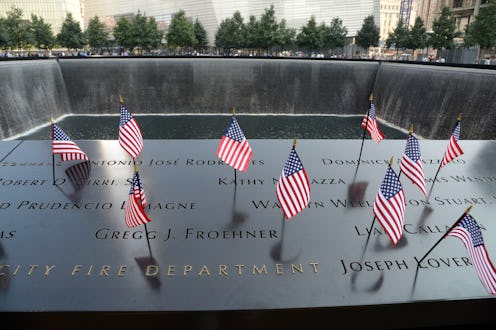News
People Are Still Dying From 9/11
It may have happened more than a decade ago, but the effects of 9/11 are still strongly felt. On Wednesday, it emerged more cops have died from illnesses related to 9/11 than the attacks themselves. According to the New York State Police Officers' Memorial in Albany, NY, which lists the names of all the New York State police officers who have died in the line of duty, 60 belong to officers who were killed in the 9/11 attacks. However, on Tuesday 20 more were added, including 12 NYPD officers and one Peekskill Police Department officer who died from illnesses stemming from the attacks on the World Trade Center.
A press release from Governor Andrew Cuomo's office noted: "The names of 13 officers who died from illnesses as a result of time spent doing search and recovery work in the wake of the Sept. 11, 2001, terrorist attack on the World Trade Center were also added to the memorial, bringing the total to 71." That number surpasses the total number of cops killed in the attacks themselves, which is 60.
Though the New York City Department of Health has claimed that there are no connections between the Ground Zero debris and cancer, all 13 of the officers whose names were recently added died of cancers. And cancer is just one of the several illnesses and disorders plaguing New Yorkers to this day.
When the Twin Towers came down, they pulverized buildings, furniture, and electronic equipment spread toxic dust into the air that continued to permeate over the next few months. The long-term effects of the dust and debris have often been life-threatening.
While the James Zadroga 9/11 Health and Compensation Act helps provide treatment and financial aid to 9/11 workers, there's little consolation for watching your health fade.
Respiratory Illness
Respiratory problems were prevalent among 9/11 rescue workers and inhabitants of Lower Manhattan immediately after the attacks. "Ninety-nine percent of exposed firefighters within the first week reported at least one new respiratory symptom while working at the World Trade Center site that they had not experienced before," writes the NYC.gov site.
Among the respiratory illnesses experienced were asthma, sinus problems, bronchitis, emphysema, and loss of lung function. The main symptoms of respiratory illness to look out for include shortness of breath, wheezing, difficulty exhaling, and persistent cough.
Cancer
Despite reports that there is no connection between cancer and the debris caused by the attacks, there is overwhelming evidence to the contrary. In 2012, the National Institute For Occupational Safety added 50 new cancers to the list of diseases that have affected 9/11 victims. Fifty.
Rates of thyroid and prostate cancer were especially high among early rescue workers who enrolled in the WTC Health Program. Last year, it was reported that according to the Centers For Disease Control and Prevention, more than 1,100 people who lived or worked near the World Trade Center after 9/11 have been diagnosed with cancer. Symptoms specific to thyroid cancer include a lump or swelling in the neck, neck pain, trouble swallowing or breathing, wheezing, and coughing.
For prostate cancer, look out for trouble urinating, blood in the urine or semen, pain in the lower back, hips, and thighs, discomfort in the pelvic area, and erectile dysfunction. Some crucial symptoms to be aware of in general that could indicate cancer include fatigue, sudden weight loss, fever, and persistent pains.
PTSD
Studies conducted by the World Trade Center Health Registry suggests that post-traumatic stress disorder is the most common health effect stemming from 9/11. Symptoms of PTSD include flashbacks of the traumatic event triggered by certain noises and sights, avoiding situations that remind you of the event, having trouble sleeping and concentrating, and feeling numb, detached, emotional irritable, and easily startled.
GERD
Many 9/11-affected people have been diagnosed with gastroesophageal reflux disease (GERD) as a result of stress from PTSD and other mental disorders stemming from the event.
According to WebMD Health News:
Researchers surveyed more than 37,000 adults who lived or worked near Ground Zero who did not report any GERD symptoms prior to 9/11. Of these, 20% had some new GERD symptoms after 9/11.
The report also found that both asthma and PTSD have been found to coexist with GERD. Symptoms of heartburn and GERD include heartburn, acid reflux, indigestion, stomach and chest pain, and cough.
